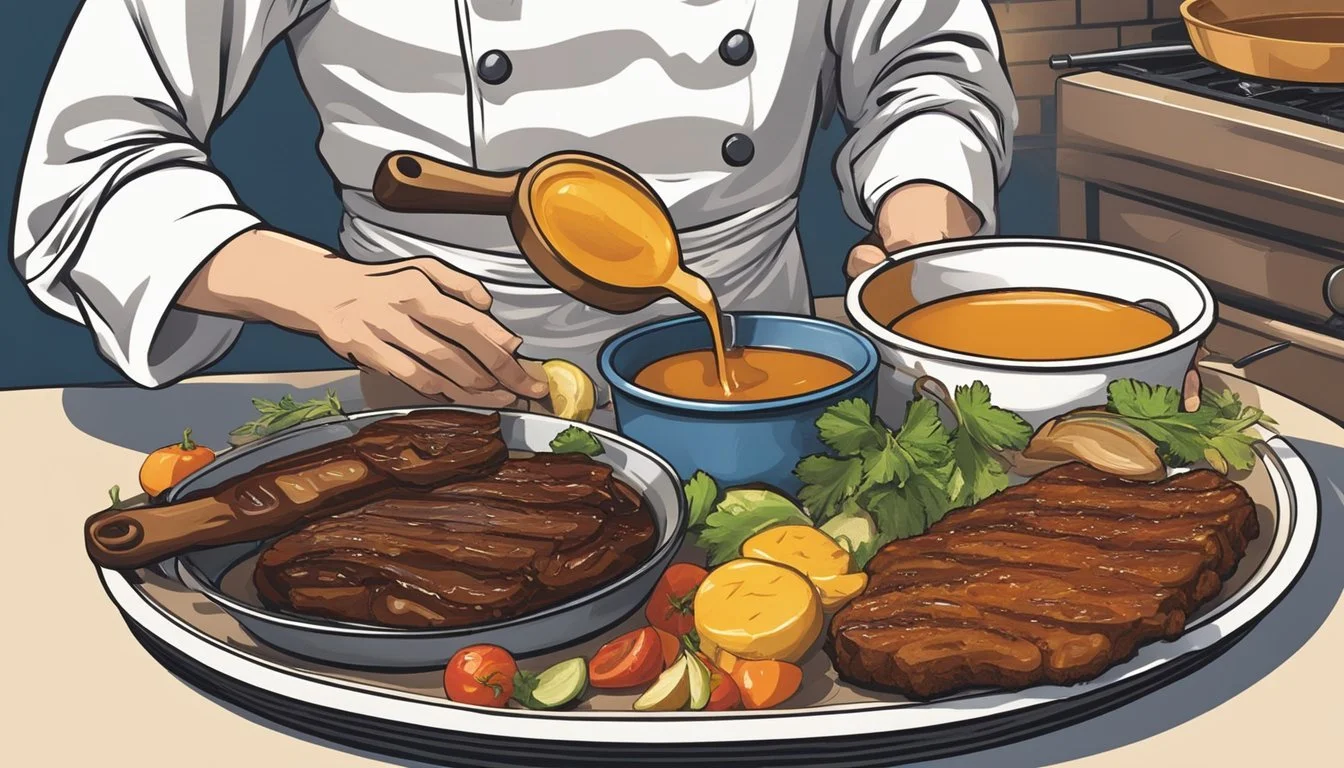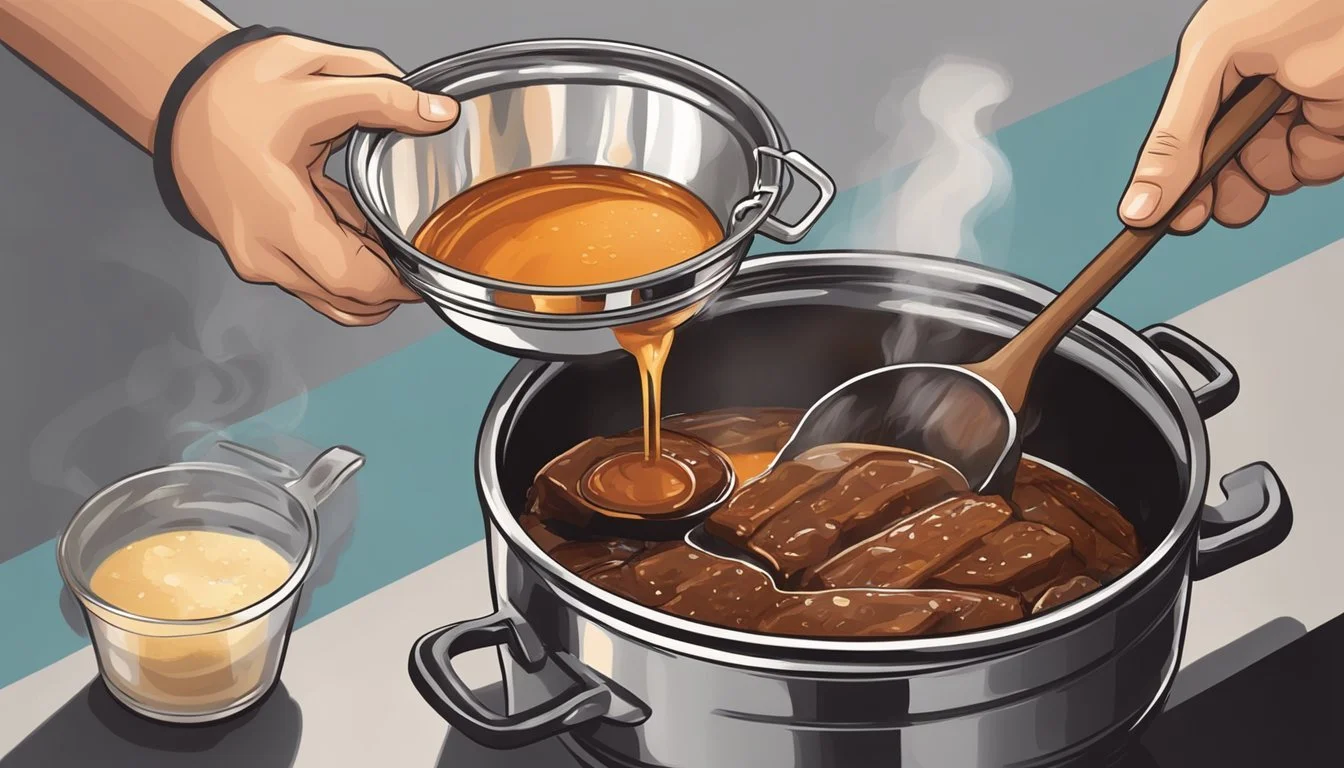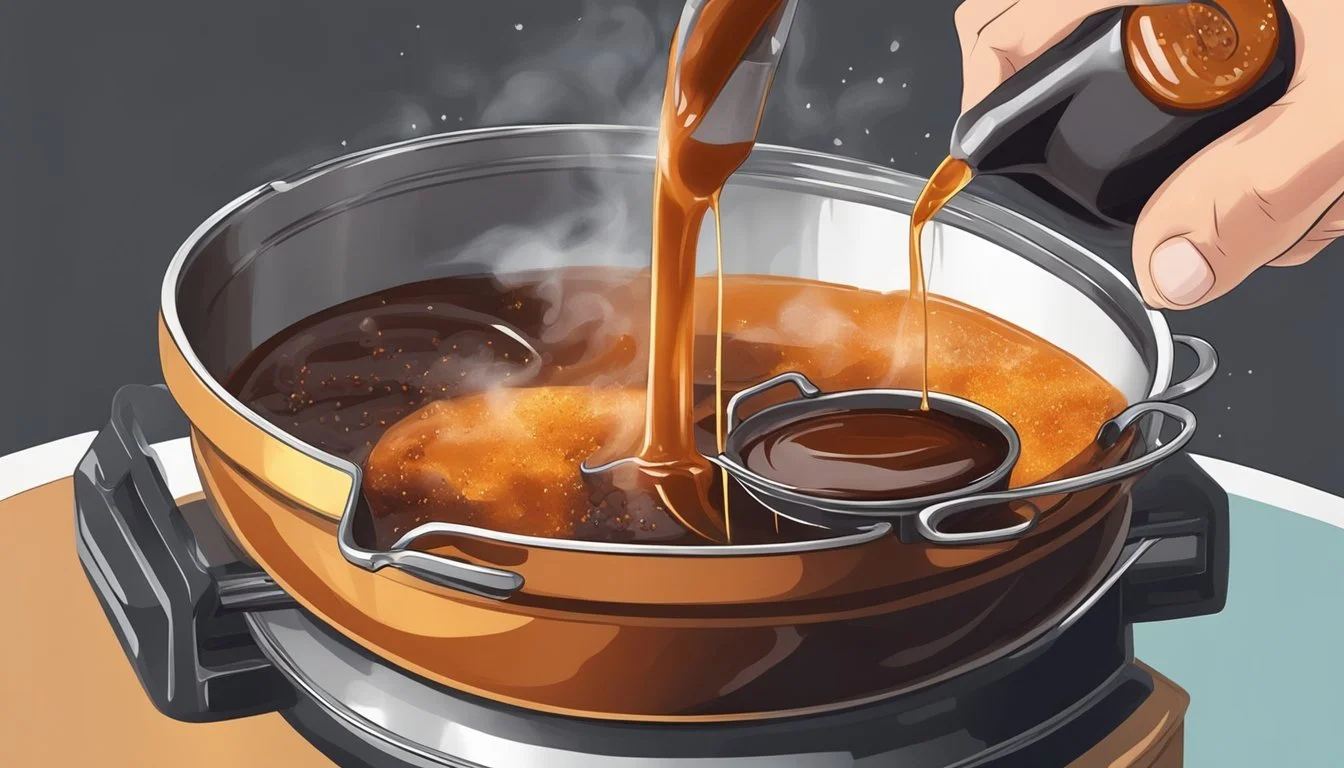Saving Burnt Barbecue Sauce
Expert Tips for Restoring Taste
Barbecuing is an art form that hinges on the delicate balance of flavor, and the sauce you choose is crucial to this endeavor. However, even experienced cooks can sometimes face the challenge of a burnt barbecue sauce that imparts a bitter taste to the dish. Understanding the methods to rescue and enhance a sauce that has taken a turn for the worse is essential for any barbecue aficionado.
There are several strategies to mitigate the bitterness of a burnt sauce and transform it into a palatable complement for grilled foods. Adding sweetness, saltiness, and using acidity judiciously are common approaches. They aim to balance the fundamental taste components, ensuring the sauce harmonizes with the smoky flavors of the barbecue (What wine goes well with barbecue?).
Spices and herbs also play a significant role in countering bitterness, while careful attention to cooking temperatures can prevent the problem from occurring in the first place. Knowing the suitable corrective actions and preventative measures can elevate a barbecuing experience, ensuring that the sauce enriches rather than detracts from the overall flavor profile.
Understanding Barbecue Sauce Basics
Barbecue sauce is a culinary staple that can elevate grilled dishes (What wine goes well with grilled dishes?) when used correctly, but its preparation requires attention to ingredients and cooking methods to avoid undesirable flavors.
Key Ingredients in BBQ Sauce
The typical barbecue sauce is composed of several key ingredients that contribute to its characteristic flavor:
Tomatoes: Serve as the base, often in the form of ketchup or pureed tomatoes.
Vinegar: Adds acidity, cutting through the sweetness and richness.
Sugar: Imports sweetness, with variations including brown sugar, molasses, or honey.
Spices and Herbs: Such as paprika, garlic powder, and mustard, are essential for depth and complexity.
Each ingredient plays a pivotal role in creating the harmony of flavors that define a good barbecue sauce. However, these ingredients, especially sugar, must be managed correctly to prevent the sauce from becoming bitter.
Common Causes of Bitterness in Sauces
Bitterness in barbecue sauces typically emerges from two primary sources:
Overheated Sugar: When sauces containing sugar are cooked at temperatures above 265°F, the sugar may burn, resulting in a bitter and unpleasant taste.
Charred Bits: If the sauce is applied too early in the grilling process, it may char due to prolonged exposure to high heat.
Understanding how these factors influence bitterness is crucial to prevent ruining the sauce’s flavor profile. It is important to remember that sauce application timing and heat management are key to maintaining the intended taste of barbecue sauce.
Preventative Measures Against Burning
One must be vigilant about the cooking temperature and consistent in stirring to fend off the risk of burning barbecue sauce. These tactics ensure the sugar within the sauce does not reach a point where it caramelizes into an unwelcome charred state.
Optimizing Cooking Temperature
The key to preventing barbecue sauce from burning lies in maintaining an appropriate heat level. Sugar, a common ingredient in barbecue sauces, begins to burn at approximately 265 degrees Fahrenheit. Therefore, when applying barbecue sauce to meat on the grill, one should do so during the last few minutes of cooking. This prevents the sauce from being exposed to high temperatures for too long and safeguards against overcooking.
Stirring and Attention
Regular stirring is essential when cooking barbecue sauce on a stovetop or when keeping it warm on the grill. It aids in even heat distribution and prevents the sauce from sticking and scorching on the bottom of the pan. Attention should be paid especially when the sauce is at a low simmer; frequent stirring will avoid the formation of burnt bits that could impart a bitter taste to the entire batch.
Adjusting Burnt BBQ Sauce
When barbecue sauce burns, it can acquire a bitter taste, but with correct adjustment techniques, one can salvage the sauce and restore a pleasing flavor balance.
Balancing Flavors to Counteract Bitterness
Burnt BBQ sauce requires immediate attention to counteract bitterness. Ingredients that introduce acidity or tartness can effectively balance out the burnt taste. Apple cider vinegar is a popular choice as it has a complex flavor that enhances the overall profile of the sauce. Incorporating a tablespoon of vinegar at a time, tasting frequently, ensures the sauce does not become overly acidic.
Citrus juices, like lemon or orange, can also introduce a refreshing zest that combats bitterness while adding another layer of flavor. Here’s a simple guideline:
Acidity Source Amount to Start Notes Apple cider vinegar 1 tablespoon Add gradually, taste after each addition. Lemon juice 1 tablespoon Provides a freshness to the sauce. Orange juice 2 tablespoons Sweeter than lemon, more subtle.
Ingredients to Sweeten and Enrich
To sweeten a bitter sauce, incorporating natural sugars can subtly mitigate the charred flavor. Applying sweet ingredients like honey, brown sugar, or maple syrup imparts richness and depth, complementing the inherent smokiness of BBQ. They should be added sparingly, stirred in a teaspoon at a time, to avoid oversweetening.
Honey: Adds a floral note and can be used to sweet sauce naturally.
Brown sugar: Melts into the sauce, offering a molasses undertone.
Maple syrup: Introduces a woodsy sweetness, unique to other sweeteners.
Add sweetness progressively and keep tasting to ensure that the levels of sweetness achieve a harmonious balance with the other flavors and do not dominate the sauce's profile.
Alternative Uses for Burnt Sauce
When barbecue sauce burns, its flavor profile changes, becoming more intense and sometimes bitter. However, one can still find novel ways to reimagine its use in the kitchen.
Creative Culinary Applications
As a Base for Savory Marinades: One can repurpose burnt barbecue sauce as a foundational element for a marinade. While the charred taste might be too strong on its own, diluting it with vinegar or citrus juices not only rebalances the flavors but also adds a unique depth to the end result.
Incorporated into Meatloaf or Burger Mix: Using burnt sauce as part of a meatloaf or burger mix can introduce a robust, smoky element. It’s advisable to mix it with other ingredients such as breadcrumbs, eggs, and spices to ensure the bitterness doesn't overpower the dish.
As an Ingredient in Homemade Chutney: Chutney, known for its complex layers of flavor, benefits from the rich undertones of burnt barbecue sauce when used sparingly. This could help in achieving a more rounded taste, especially when combined with fruits like apples or pears.
Enhanced Baked Beans: Introducing burnt sauce into a recipe for baked beans could enhance the dish's overall richness. The burnt notes can complement the natural sweetness of the beans, provided they are balanced with appropriate seasoning.
In summary, burnt barbecue sauce needn't be discarded. With careful thought and pairing with complementary ingredients, one can transform this kitchen mishap into a versatile component for an array of culinary endeavors.
Complementary Pairings and Dishes
Selecting the right meats and vegetables to pair with barbecue sauces critically impacts the overall flavor and success of a dish. Each pairing should complement the sauce's profile, enhancing the taste without overpowering it.
Meats and Vegetables That Enhance BBQ Sauces
When one considers chicken, it's important to note that its mild flavor makes it an excellent canvas for barbecue sauces. A smoky or spicy sauce can bring out the best in grilled chicken, lending it complexity. For vegetables, corn on the cob or grilled zucchini (What wine goes well with grilled zucchini?) can be elevated with a light brush of sweet and tangy barbecue sauce, which caramelizes beautifully during the grilling process, offering a delightful contrast to the vegetable's natural flavors.
Moving on to red meat, a robust tomato-based barbecue sauce with undertones of sweetness can complement the savory flavors of grilled steak or ribs. The sauce's boldness pairs well with the richness of the meat, and a hint of vinegar in the sauce can cut through the fat, balancing the taste exquisitely.
Moreover, incorporation of vegetable sides like roasted bell peppers or a tangy coleslaw can provide a refreshing counterpoint that cleanses the palate, making them indispensable companions to a hearty meat-centric barbecue meal.
Advanced Techniques for Recovery
When a barbecue sauce starts tipping towards an unwanted bitter taste, rescuing it involves careful balancing of flavors using culinary techniques that can reverse the bitterness and enrich the sauce.
Rescuing with Acidity and Dilution
To mitigate the bitterness in barbecue sauce, a chef might introduce an acidic element which can brighten the sauce and counteract the bitter notes. The process generally starts with adding small amounts of acidity and then carefully tasting to achieve the right balance. Here are some effective acidic agents and methods for dilution:
Vinegar: A splash of apple cider vinegar or white vinegar can provide the necessary tartness and complexity.
Citrus Juice: Lemon or lime juice not only adds acidity but also a hint of freshness to the sauce.
Tomatoes: Incorporating a bit of tomato paste or fresh tomatoes can introduce both acidity and sweetness.
Dilution entails thinning the sauce, which can help disperse the bitter flavor. This can be done by adding small quantities of:
Water: The simplest dilution agent, water can lighten the flavor without altering it too much.
Broth: Chicken or vegetable broth adds a savory note as well as moisture.
Use of Umami and Savory Elements
Umami and savory ingredients introduce depth and complexity that can overshadow bitterness. They can be powerful allies in rescuing a burnt sauce:
Onion and Garlic: Sauteed onions or a hint of garlic add not only a savory quality but also sweetness once caramelized.
Soy Sauce: A touch of soy sauce can contribute a rich umami flavor that works well with hearty BBQ dishes.
Anchovy Paste or Fish Sauce: These are potent umami boosters used sparingly to enrich the overall flavor profile.
Spices and Herbs: A carefully selected blend of spices and herbs such as cumin, smoked paprika, thyme, or oregano can elevate the sauce, adding aromatic layers that detract from the bitterness.
Employing these advanced techniques allows one to transform a bitter barbecue sauce into a well-balanced condiment that can elevate any grilled dish.
Preparation Tips and Tricks
In saving a burnt barbecue sauce, understanding the impact of sugar types and the role of various liquids can be pivotal in correcting flavors. Achieving the right balance requires specific adjustments.
The Role of Sugar Types and Altering Sweetness Levels
Different sugars contribute varying flavors to barbecue sauce:
Brown Sugar: Offers a deep, caramel-like sweetness which can mask bitter tones.
Maple Syrup: Provides a smooth, distinct flavor with a touch of woodiness.
Honey: Yields a rich sweetness that complements tangy profiles.
By adjusting the levels of these sweeteners, one can enhance the sauce's overall sweetness to counteract any bitterness from charring.
Incorporating Liquids for the Desired Sauce Consistency
Liquids play an essential role in both texture and taste:
Apple Cider Vinegar: Adds a tangy kick that can balance excessive sweetness.
Wine: A dash of wine can introduce complexity and acidity, aiding in flavor balance.
Liquid such as Soy Sauce: Introduces saltiness, which can mitigate bitterness.
Water: Thins out overly thick sauces, helping to distribute flavors more evenly.
Carefully adjusting these liquids allows the cook to achieve the desired consistency and flavor profile in their barbecue sauce, turning potential disaster into a delicious dish.
Cleaning and Maintenance Post-Cooking
After a barbecue session, cleaning up effectively can extend the life of your cookware and grill while ensuring that flavors stay true during your next cookout.
Effectively Removing Burnt Residue
To remove burnt residue from your grill or cookware, one should start by soaking the equipment in hot, soapy water, which helps to soften the charred remnants. After a soak of at least 30 minutes, using a scrub brush can aid in dislodging tough bits. For a non-toxic cleaning agent, a paste made from baking soda and water is highly effective. For more challenging residue, applying a mixture of distilled white vinegar and baking soda can cause a chemical reaction that will lift burnt deposits, making them easier to scrub away.
Steps to clean burnt residue:
Soak equipment in hot soapy water to soften residue.
Use a scrub brush to remove softened char.
Apply a paste of baking soda and water to tough spots.
For stubborn areas, mix vinegar with baking soda and apply to the area before scrubbing.
Preventing Equipment Damage and Rusting
Regular maintenance is crucial in preventing damage and rusting of barbecue equipment. After each use, equipment should be cleaned to prevent the buildup of charred material, which can lead to rusting. Once clean, thoroughly drying the equipment will prevent moisture from causing rust. A protective coat of cooking oil rubbed onto the surfaces can help to form a barrier against rust and corrosion. Additionally, storing equipment in a dry place will further protect it from the elements.
Steps to prevent damage and rusting:
Clean equipment after use to avoid buildup.
Dry thoroughly to prevent moisture-related rusting.
Coat surfaces with cooking oil to protect against rust.
Store in a dry environment to minimize exposure to elements.
Proper cleaning and diligent maintenance can ensure that your barbecue equipment remains in great condition for years of enjoyable cooking.
Seasoning Adjustments
When rescuing a burnt barbecue sauce, the key is to identify and correct disproportions in saltiness and spices. This can involve both adding and reducing certain ingredients to achieve a well-balanced flavor.
Managing Saltiness and Spices
If a barbecue sauce tastes excessively salty, one can dilute the saltiness without sacrificing flavor. Adding a touch of sweetness may balance the salt. Options include honey, molasses, or brown sugar, each bringing its own depth to the sauce. However, it is essential to add these sweeteners incrementally, tasting after each addition, to prevent the sauce from becoming overly sweet.
Conversely, for sauces that lack a salty edge, a small amount of salt, soy sauce, or even a splash of vinegar can enhance the other spices present in the sauce. Vinegar provides acidity which can brighten the flavors and counteract the bitterness of burnt ingredients.
In dealing with the spice aspect, an overabundance of any one spice can overwhelm a sauce. For example, cayenne pepper and chili powder both contribute heat, whereas paprika can add a mild, sweet note or a smoky essence depending on its variety. If the sauce has become too spicy, introducing a dairy product like butter can mellow the heat.
For sauces that have turned bitter from charred elements, using spices such as garlic powder can introduce a savory note that detracts from the bitterness and adds a layer of complexity.
When adjusting the spices, always start with small amounts, building up the flavor gradually:
Salt and Salty Ingredients
Salt: Start with a pinch.
Soy sauce: Begin with a teaspoon and adjust to taste.
Vinegar: Add in increments of a teaspoon, tasting after each addition.
Sweetening Agents
Honey/Brown Sugar: Introduce by the tablespoon, tasting as you go.
Molasses: Use sparingly due to its intense flavor, starting with a teaspoon.
Spices
Garlic powder: Begin with a quarter teaspoon and adjust to preference.
Paprika: Adjust by starting with half a teaspoon, considering its strength.
Cayenne Pepper/Chili Powder: Increment with caution, use a pinch or up to an eighth of a teaspoon, taste, then adjust accordingly.
Remember, making seasoning adjustments is a careful process of refining flavors step by step. Each addition should be followed by tasting to avoid overcorrecting and risk masking the original barbecue sauce character.







